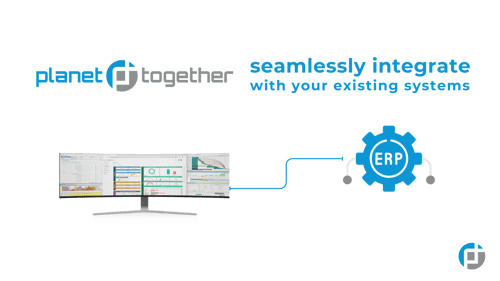Global Supply Chains, Reinvented: A New Era for Industrial Manufacturing Leaders
In the current age of economic uncertainty, geopolitical upheaval, and rapid technological advancement, the phrase “global supply chain” has taken on new dimensions. For Operations Directors in industrial manufacturing, reimagining global supply chains is no longer a forward-looking strategy—it's a present-day imperative.
Global disruptions—ranging from pandemics to port closures, raw material shortages, cyberattacks, and shifting regulatory landscapes—have exposed critical vulnerabilities in traditional supply chain models. Industrial manufacturers, long focused on efficiency and cost reduction, are now tasked with building supply chains that are not just lean, but resilient, agile, and intelligent.
This transformation demands more than just localized sourcing or dual supplier strategies. It requires a connected, data-driven operations model enabled by advanced planning technologies, like PlanetTogether APS, integrated seamlessly with ERP and MES systems such as SAP, Oracle, Microsoft Dynamics, Kinaxis, and Aveva.
Let’s explore how Operations Directors can drive this transformation and reimagine their global supply chains for long-term success.
The Case for Reimagining: Why Traditional Supply Chains Fall Short
Historically, global supply chains have been optimized for cost and efficiency. But as we've seen in recent years, this model often crumbles in the face of external shocks. The issues are compounded in industrial manufacturing, where:
Production lead times are long
Assets are capital-intensive and inflexible
Material availability is tightly linked to global suppliers
Inventory carrying costs are high
Downstream demand is increasingly volatile
These pain points have led many operations leaders to ask, “How can we continue to grow while managing uncertainty and minimizing operational risk?” The answer lies in building supply chain visibility, predictive capability, and strategic flexibility—and doing so through integrated technologies.

The Role of PlanetTogether APS in Modern Supply Chains
PlanetTogether Advanced Planning and Scheduling (APS) has emerged as a powerful engine to orchestrate supply chain transformation. When integrated with leading ERP and MES platforms such as SAP, Oracle, Microsoft Dynamics, Kinaxis, or Aveva, PlanetTogether empowers Operations Directors to optimize both production and supply chain performance in real time.
Here’s how:
Real-Time Synchronization Across Global Operations
Imagine your production sites in North America, Europe, and Asia all operating from a single source of truth. With PlanetTogether integrated into SAP or Oracle ERP, your scheduling engine is constantly updated with inventory levels, customer orders, supplier deliveries, and shop floor status—no batch updates, no manual imports, no silos.
This real-time synchronization enables quick response to disruptions and ensures production schedules reflect current constraints and priorities.
Scenario Planning and Risk Mitigation
What happens if a key supplier in China shuts down unexpectedly? Or a critical raw material sees a 20% price spike?
With PlanetTogether’s scenario planning features, integrated via platforms like Kinaxis RapidResponse, Operations Directors can simulate multiple scenarios—supplier outages, capacity constraints, labor shortages—and immediately see how each affects production and delivery timelines. These simulations allow you to make informed decisions with agility, reducing exposure to risks before they escalate into crises.
Optimized Capacity Planning
Industrial manufacturers often deal with finite capacity across multiple facilities, each with varying constraints. Integrating PlanetTogether with Aveva MES or Microsoft Dynamics 365 Supply Chain Management allows the APS system to pull real-time data from machines, labor shifts, and maintenance windows. This empowers the scheduler to allocate resources more effectively, avoiding overloading and minimizing downtime.
The result? Higher throughput, reduced changeover times, and improved on-time delivery performance—despite fluctuating demand or supplier variability.

Building an Integrated Digital Supply Chain Ecosystem
To truly reimagine your global supply chain, technology integration must go beyond surface-level connectivity. Here’s how integration with specific platforms helps enable the digital transformation of supply chains:
SAP S/4HANA + PlanetTogether
SAP’s robust ERP capabilities form the backbone of many industrial manufacturing organizations. By embedding PlanetTogether APS into SAP S/4HANA, Operations Directors can extend traditional MRP into intelligent, constraint-based scheduling. Production planners gain visibility into how material availability, supplier lead times, and shop floor capacity impact order fulfillment—in real time.
Oracle SCM Cloud + PlanetTogether
Oracle’s cloud-first approach aligns perfectly with multi-site operations. When PlanetTogether is integrated with Oracle SCM, the planning engine receives up-to-the-minute demand signals and supply updates, enabling adaptive scheduling and global production balancing. This reduces bottlenecks and enables demand smoothing across facilities.
Microsoft Dynamics 365 + PlanetTogether
For mid-sized industrial manufacturers, Dynamics 365 offers a cost-effective yet powerful ERP suite. When paired with PlanetTogether, Dynamics becomes more than an ERP—it becomes a supply chain command center. The integration enables automatic schedule adjustments in response to order changes, equipment availability, and material shortages.
Kinaxis RapidResponse + PlanetTogether
Kinaxis offers world-class supply chain orchestration capabilities. When connected with PlanetTogether, RapidResponse simulations can directly inform and update finite-capacity production schedules, giving Operations Directors a full-circle view from forecast to finished goods. This is ideal for companies managing demand variability and global inventory allocation.
Aveva MES + PlanetTogether
Aveva’s Manufacturing Execution System provides granular, real-time production data. PlanetTogether’s integration with Aveva helps close the loop between planning and execution. As soon as machine status, operator availability, or work order progress changes, PlanetTogether adjusts schedules accordingly—eliminating blind spots and boosting responsiveness.
Key Benefits of Reimagining Global Supply Chains with Integrated APS
By embracing PlanetTogether APS as the heart of an integrated supply chain ecosystem, Operations Directors can unlock:
Faster Response Times to market disruptions and demand shifts
Lower Operating Costs through better asset utilization and reduced expediting
Improved Delivery Performance with dynamic, real-time scheduling
Higher Resilience through scenario-based contingency planning
Strategic Visibility across global networks for better executive decision-making
These are not just operational gains—they’re strategic enablers for competitiveness in the global industrial manufacturing landscape.
Industrial manufacturing is undergoing a profound shift. The most successful Operations Directors will be those who recognize that traditional supply chains—focused on low cost and predictability—no longer fit today’s dynamic environment.
The new playbook centers around agility, visibility, and integration. By connecting PlanetTogether APS with ERP, MES, and supply chain orchestration tools like SAP, Oracle, Microsoft, Kinaxis, and Aveva, Operations Directors can lead this transformation with confidence.
Global supply chains aren’t disappearing. They’re evolving. And those who reimagine them today will define manufacturing excellence for the next decade.
Ready to take the first step toward a resilient, agile supply chain? Contact us today to learn more about how PlanetTogether can help you achieve your goals and drive success in your industry.
Topics: Industrial Manufacturing, PlanetTogether Software, Integrating PlanetTogether, Scenario Planning and Risk Mitigation, Optimized Capacity Planning, Real-Time Synchronization Across Global Operations





















LEAVE A COMMENT